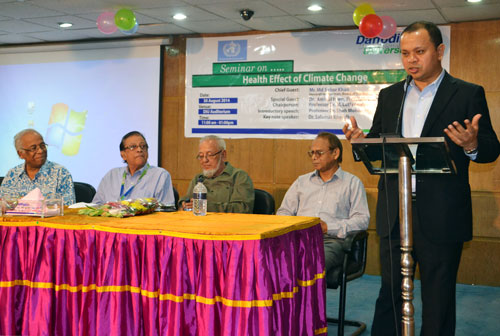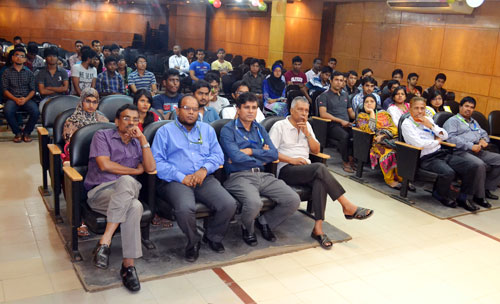Department of Public Health of Daffodil International University (DIU) in collaboration with World Health Organization ( WHO), Dhaka jointly organized a seminar on ‘Health effect of climate change in Bangladesh’ on August 30, 32014 at DIU Auditorium. Mr. Md. Sabur Khan, FRSA. Chairman, Board of Trustees, Daffodil International University graced the seminar as chief guest while Dr. Aminul Islam, Emeritus Professor, Daffodil International University presided over the seminar.
Dr. Salamat Khandker, Associate Professor, Department of Public Health presented the keynote paper in the seminar. The seminar was also addressed by Prof Dr. S.M. Mahbubul Haque Majumder, Daen, Faculty of Allied Health Sciences and Professor Dr. S.M. Keramat Ali.

Mr. Md. Sabur Khan, Chairman, Daffodil International University addressing the seminar on‘Health effect of climate change in Bangladesh’ jointly organized by WHO & DIU at DIU Auditorium.
While presenting the keynote paper Dr. Salamat Khandker highlighted the adverse health effect of climate change particularly in costal belt of Bangladesh. He further stated that some of the vectors borne diseases are spreading in non-endemic areas of Bangladesh. It was notable that non-climatic factors affecting climate-induced health outcomes e.g. population growth, demographic change, standards of living, access to health care, improvements in health care, public health infrastructure. These influences make understanding of the health impacts of climate change complicated.

A partial view of the audience
Professor Dr. S.M. Keramat Ali underscored the importance of addressing health effect of climate change in global perspective. It was noted that during coming decade’s number of heat stroke, risk of vector borne diseases, like Malaria, Dengue fever, Ross River Virus, West Nile will increase globally. Ozone depletion and climate change are 2 different but related problems; caused by release of CFC and HCHC, ozone depletion most noticeable over the Polar Regions. CFC also contributes to enhanced greenhouse effect. “Climate change currently contributes to the global burden of disease and premature deaths. At this early stage the effects are small, but are projected to progressively increase in all countries and regions.” he added

